Have you ever thought about the role renewable heat pumps play in the larger efforts to save energy?
In this article, we’ll dive into the world of renewable heat pumps and explore their potential for revolutionizing the way we heat our homes.
From understanding the basics to evaluating their efficiency, we’ll cover it all.
So, if you’re ready to learn about the innovative future of heating systems, keep reading.

Key Takeaways
- Renewable heat pumps use electricity to transfer heat from one place to another, extracting heat from the air, ground, or water.
- They provide up to four times the energy output compared to the electricity input, contributing to a greener future and reducing greenhouse gas emissions.
- Renewable heat pumps offer both heating and cooling, maximizing comfort and energy efficiency.
- Evaluating the energy efficiency of renewable heat pumps can be done through measures like the Coefficient of Performance (COP) and Seasonal Performance Factor (SPF), which indicate their cost savings and overall efficiency.
The Basics of Renewable Heat Pumps
We’ll start by explaining how heat pumps work and why they’re considered a renewable energy source.
Heat pumps are innovative devices that use a small amount of electricity to move heat from one place to another, rather than generating heat directly. They work by extracting heat from the air, ground, or water, and transferring it into a building for heating purposes. This process is highly efficient and can provide up to four times the energy output compared to the electricity input.
By utilizing renewable energy sources such as the ambient air or the ground, heat pumps contribute to a greener future. They help reduce greenhouse gas emissions and dependence on fossil fuels.
Understanding renewable energy and the benefits of renewable heating is crucial for individuals and communities seeking sustainable and efficient solutions for their heating needs.

Understanding How Renewable Heat Pumps Work
Heat pumps work by absorbing heat from the environment and transferring it into a building for heating purposes. This process is achieved through the use of a refrigerant that goes through a cycle of evaporation, compression, condensation, and expansion.
When the refrigerant evaporates, it absorbs heat from the surrounding air, ground, or water source. The warm refrigerant is then compressed, which increases its temperature. This heat is then released into the building through a heat exchanger.
To maintain the efficiency of a renewable heat pump, proper installation and regular maintenance are crucial. During installation, factors like the building’s insulation and layout should be considered to optimize performance.
Regular maintenance includes cleaning or replacing filters, checking refrigerant levels, and inspecting electrical connections. By ensuring proper installation and maintenance, the renewable heat pump can continue to operate efficiently and provide sustainable heating for the building.

Different Types of Renewable Heat Pumps
For our discussion on different types of renewable heat pumps, let’s explore the options available in the market.
Renewable heat pumps come in various forms, each designed to suit different applications and meet specific maintenance requirements. Here are four types of renewable heat pumps to consider:
-
Air-source heat pumps: These pumps extract heat from the outdoor air and transfer it indoors, providing both heating and cooling capabilities. They’re easy to install and require minimal maintenance.
-
Ground-source heat pumps: Also known as geothermal heat pumps, these systems extract heat from the ground and use it for heating purposes. They’re highly efficient and can provide consistent heating throughout the year.

-
Water-source heat pumps: These pumps extract heat from a water source, such as a lake or river, and distribute it for heating purposes. They’re ideal for areas near a water source and can be highly efficient.
-
Hybrid heat pumps: These systems combine the use of a heat pump with a conventional heating system, such as a gas or oil boiler. This allows for greater flexibility and efficiency, especially during extreme weather conditions.
Understanding the different types of renewable heat pumps is crucial in determining the most suitable option for your needs.
Now, let’s explore the benefits of using renewable heat pumps.

The Benefits of Using Renewable Heat Pumps
We can enjoy numerous benefits by using renewable heat pumps, such as increased energy efficiency and reduced carbon emissions. Renewable heat pumps offer environmental advantages that contribute to a sustainable future. Here are the key benefits of using renewable heat pumps:
| Benefits of Renewable Heat Pumps | Explanation |
|---|---|
| 1. Energy Efficiency | Renewable heat pumps use a small amount of electricity to transfer heat from the air, ground, or water, making them highly energy-efficient. This results in lower energy bills and reduced reliance on fossil fuels. |
| 2. Reduced Carbon Emissions | By harnessing natural heat sources, renewable heat pumps produce significantly fewer greenhouse gas emissions compared to traditional heating systems. This helps combat climate change and improve air quality. |
| 3. Versatility | Renewable heat pumps can provide both heating and cooling, offering year-round comfort in residential and commercial buildings. They can also be integrated with existing heating systems, maximizing flexibility and adaptability. |
| 4. Long-Term Cost Savings | Although renewable heat pumps require an initial investment, their operational costs are lower compared to conventional heating systems. Over time, users can enjoy significant savings on energy bills, offsetting the initial expense. |
Evaluating the Energy Efficiency of Renewable Heat Pumps
To accurately evaluate the energy efficiency of renewable heat pumps, we need to consider factors such as the coefficient of performance (COP) and seasonal performance factor (SPF). Here are four key elements to consider when evaluating the performance and energy savings of renewable heat pumps:
-
COP: The COP measures the ratio of heat output to electrical energy input. A higher COP indicates greater energy efficiency and cost savings.
-
SPF: The SPF takes into account the COP over an entire heating season, including variations in outside temperatures. It provides a more comprehensive assessment of energy efficiency.
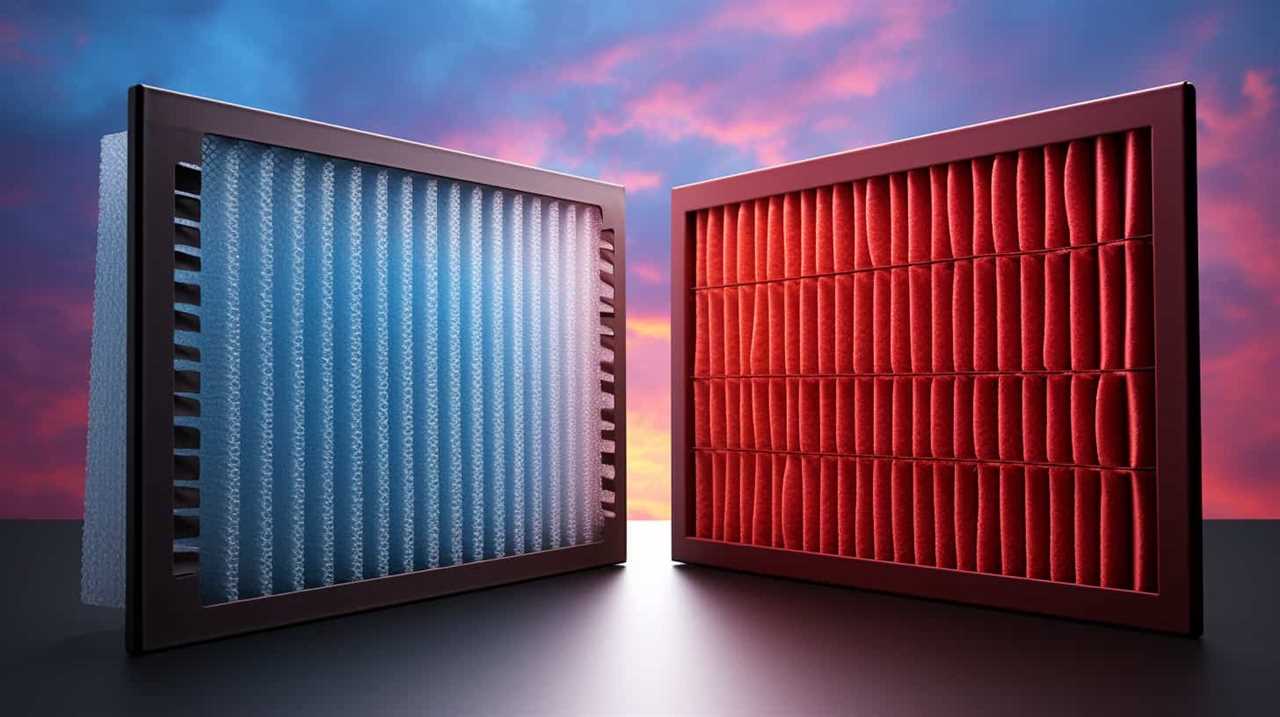
-
Energy Savings: Renewable heat pumps can significantly reduce energy consumption compared to traditional heating systems, leading to long-term cost savings and lower carbon emissions.
-
Monitoring and Analysis: Regular monitoring and analysis of system performance can identify potential issues and optimize energy efficiency, ensuring maximum savings and performance.
By evaluating these performance metrics and understanding the potential energy savings, we can make informed decisions about the adoption of renewable heat pump technology.
Now, let’s explore the environmental impact of renewable heat pumps.
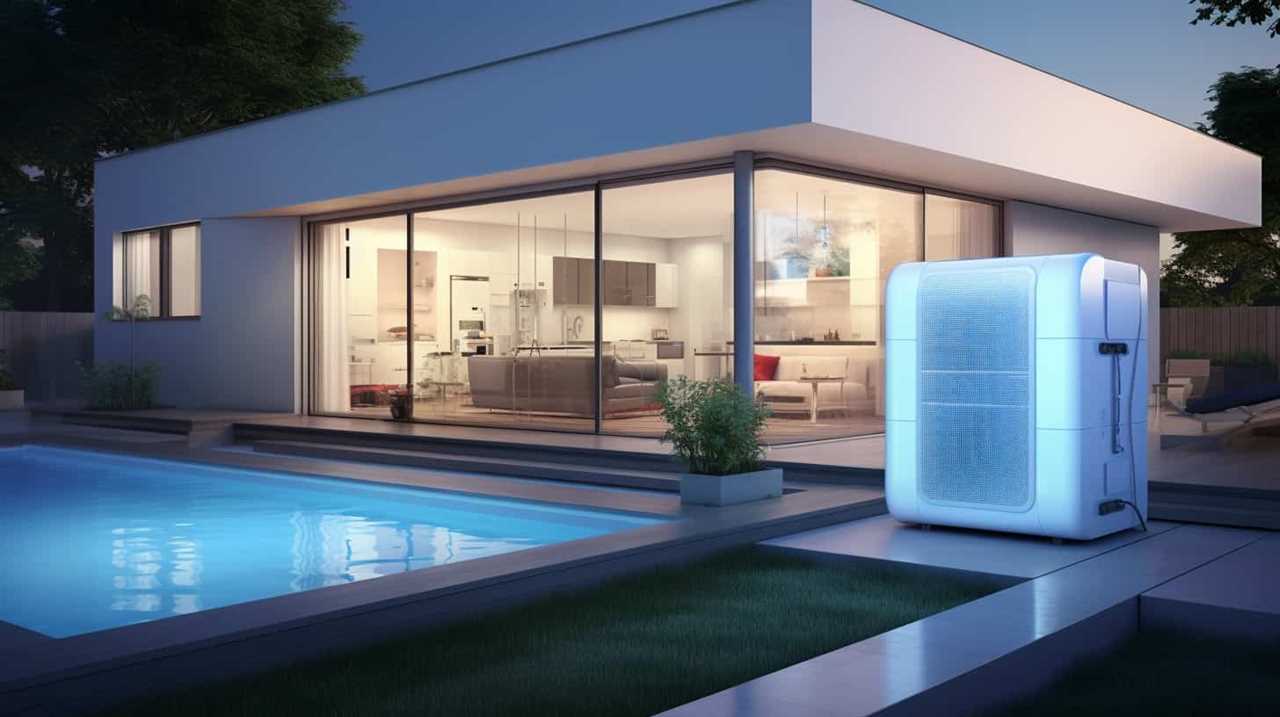
Exploring the Environmental Impact of Renewable Heat Pumps
The environmental impact of renewable heat pumps can be assessed by examining their energy consumption and carbon emissions.
Renewable heat pumps are known for their energy efficiency, as they can provide heating and cooling by utilizing the natural energy sources such as air, water, or ground. Compared to traditional heating systems, renewable heat pumps have the potential to reduce carbon emissions and lower energy consumption, leading to a smaller ecological footprint.
However, it’s important to explore the cost effectiveness of renewable heat pumps, as they can require a significant initial investment for installation and maintenance. Additionally, potential drawbacks include the need for proper insulation and the reliance on electricity.
Overall, considering the environmental benefits and potential drawbacks is crucial when deciding whether to install a renewable heat pump.

Transitioning into the next section, let’s now discuss the factors to consider before making this decision.
Factors to Consider Before Installing a Renewable Heat Pump
Before installing a renewable heat pump, there are several factors to consider.
One important consideration is the cost-effectiveness of heat pumps. While initial installation costs may be higher than traditional heating systems, heat pumps can provide long-term savings on energy bills.
Additionally, it’s crucial to evaluate the environmental benefits of heat pumps, such as reduced carbon emissions and reliance on fossil fuels.

Cost-Effectiveness of Heat Pumps
Considering the potential long-term energy savings and environmental benefits, installing a renewable heat pump can be a cost-effective decision for homeowners. Here are four factors to consider before making the investment:
-
Cost Benefit Analysis: Conduct a thorough cost benefit analysis to determine if the savings from reduced energy consumption outweigh the initial installation costs. Consider factors such as the cost of electricity, the lifespan of the heat pump, and any available incentives or rebates.
-
Return on Investment: Calculate the return on investment (ROI) by comparing the upfront costs with the estimated energy savings over the heat pump’s lifespan. This will help you assess how long it will take to recoup your initial investment.
-
Efficiency Ratings: Look for heat pumps with high efficiency ratings, such as the Seasonal Coefficient of Performance (SCOP) and the Seasonal Energy Efficiency Ratio (SEER). Higher ratings indicate greater energy efficiency and potential savings.

-
Maintenance and Repairs: Consider the long-term maintenance and repair costs associated with the heat pump. Regular maintenance can improve the system’s efficiency and extend its lifespan, while unexpected repairs can impact the overall cost-effectiveness.
Environmental Benefits of Heat Pumps
We should evaluate the environmental impact of heat pumps before deciding to install a renewable heat pump.
Heat pumps offer several environmental benefits that make them a sustainable heating option. One significant advantage is the reduction in carbon footprint. Heat pumps operate by transferring heat from one location to another, rather than burning fossil fuels to generate heat. This process significantly reduces greenhouse gas emissions, helping to combat climate change.
Additionally, heat pumps are highly energy-efficient, using less electricity to produce heat compared to traditional heating systems. By choosing a renewable heat pump, individuals can contribute to the global effort to reduce carbon emissions and promote a more sustainable future.

It’s important to consider these environmental benefits when deciding on a heating system for our homes or buildings.
Comparing Renewable Heat Pumps to Traditional Heating Systems
When comparing renewable heat pumps to traditional heating systems, two key points to consider are efficiency and cost.
Heat pumps are known for their high efficiency, as they transfer heat from the environment to warm the indoor space, rather than generating heat themselves. This can result in significant energy savings and lower utility bills.
Additionally, while the upfront cost of installing a heat pump may be higher than traditional systems, the long-term cost savings can often outweigh the initial investment.

Efficiency of Heat Pumps
Renewable heat pumps offer higher efficiency compared to traditional heating systems. This is due to their innovative technology and ability to harness renewable energy sources. Here are four reasons why heat pumps are more efficient:
-
Evaluating Performance: Heat pumps use a coefficient of performance (COP) to measure their efficiency. This indicates the ratio of heat output to energy input. Renewable heat pumps typically have higher COP values, meaning they produce more heat for less energy consumption.
-
Energy Savings: By utilizing renewable energy sources such as air, ground, or water, heat pumps can achieve significant energy savings compared to traditional heating systems. This not only reduces carbon emissions but also lowers utility bills for homeowners.
-
Heat Recovery: Heat pumps have the ability to recover waste heat from various sources, such as ventilation systems or industrial processes. This further enhances their efficiency by utilizing otherwise wasted energy.
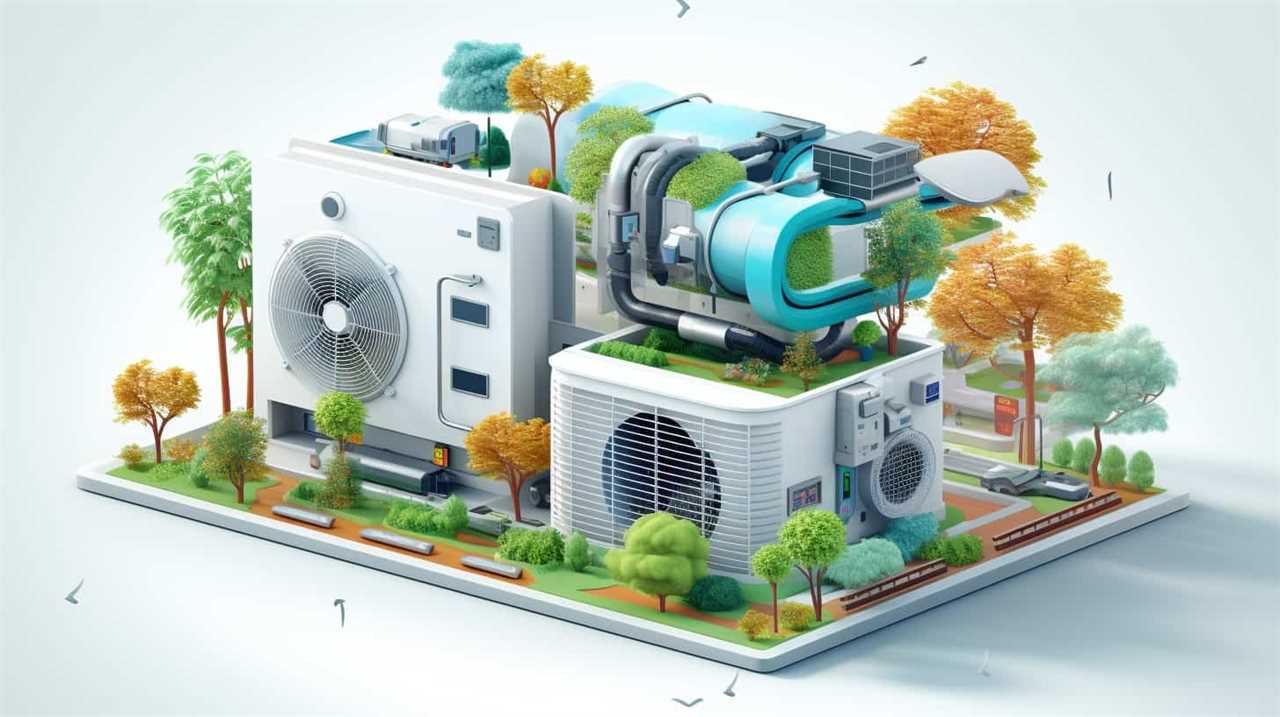
-
Variable Speed Technology: Many heat pumps are equipped with variable speed compressors, allowing them to adjust their output based on demand. This ensures optimal performance and energy efficiency throughout the year.
Cost Comparison With Traditional Systems
Compared to traditional heating systems, renewable heat pumps offer potential cost savings over time. While the upfront cost of installing a renewable heat pump may be higher, the long-term cost effectiveness and return on investment make it a favorable option.
Traditional heating systems rely on fossil fuels such as natural gas or oil, which are subject to price fluctuations and increasing costs. In contrast, renewable heat pumps utilize natural sources of energy such as the air, ground, or water, which are abundant and free. This significantly reduces heating costs and provides a stable and predictable source of energy.
Additionally, renewable heat pumps have a longer lifespan compared to traditional systems, further enhancing their cost effectiveness. Investing in a renewable heat pump not only reduces carbon emissions but also offers financial benefits in the form of lower energy bills and long-term savings.

Addressing Common Misconceptions About Renewable Heat Pumps
Let’s clear up some misconceptions about how renewable heat pumps work. Here are four common misconceptions about renewable heat pumps that need debunking:
-
Renewable heat pumps only work in warm climates: This is a myth. Renewable heat pumps can work efficiently even in colder climates, as they extract heat from the air or ground and transfer it into your home.
-
Renewable heat pumps are expensive: While the initial installation cost may be higher, renewable heat pumps can save you money in the long run through reduced energy consumption and lower utility bills.
-
Renewable heat pumps are noisy: Modern renewable heat pumps are designed to operate quietly, ensuring a comfortable and peaceful environment in your home.
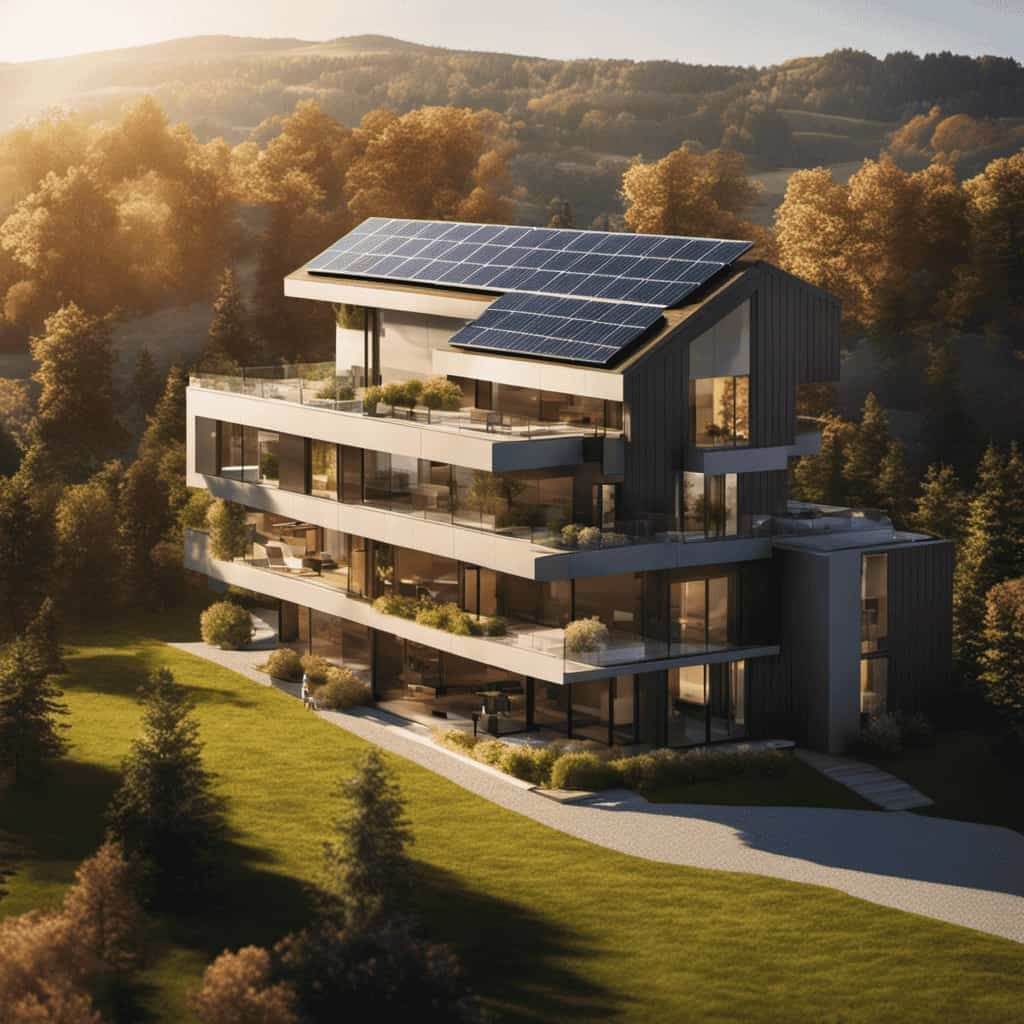
-
Renewable heat pumps require frequent maintenance: Once installed, renewable heat pumps require minimal maintenance, with routine check-ups and filter cleaning being the main tasks.
Tips for Maximizing the Efficiency of Your Renewable Heat Pump
How can we effectively maximize the efficiency of our renewable heat pump? There are several tips and strategies that can help us achieve this goal. By following these guidelines, we can not only improve the performance of our heat pump but also maximize our savings in the long run.
One important aspect to consider is proper maintenance and regular servicing of the heat pump. This includes cleaning or replacing filters, checking for any leaks or issues, and ensuring that all components are functioning optimally. Another tip is to properly insulate our homes to minimize heat loss, allowing the heat pump to operate more efficiently. Additionally, using a programmable thermostat can help regulate the temperature and reduce energy consumption when heating or cooling is not required.
Table: Tips for Maximizing the Efficiency of Your Renewable Heat Pump

| Tip | Description |
|---|---|
| Regular maintenance | Clean or replace filters, check for leaks or issues, and ensure all components are functioning optimally. |
| Proper insulation | Minimize heat loss by properly insulating your home. |
| Use a programmable thermostat | Regulate temperature and reduce energy consumption when heating or cooling is not required. |
The Future of Renewable Heat Pumps: Innovations and Potential Advancements
As the demand for renewable heat pumps continues to rise, the future of this technology looks promising with the emergence of innovative advancements.
One area of focus is the development of new heat pump technologies that aim to maximize energy efficiency. These advancements can potentially lead to even greater energy savings and reduced carbon emissions, making renewable heat pumps an increasingly attractive option for heating and cooling needs.
Emerging Heat Pump Technologies
We are excited about the potential of emerging heat pump technologies to revolutionize the future of renewable heat pumps. These advancements in heat pump technology show great promise in increasing energy efficiency and reducing carbon emissions.
Here are four key areas where these emerging technologies are making a significant impact:
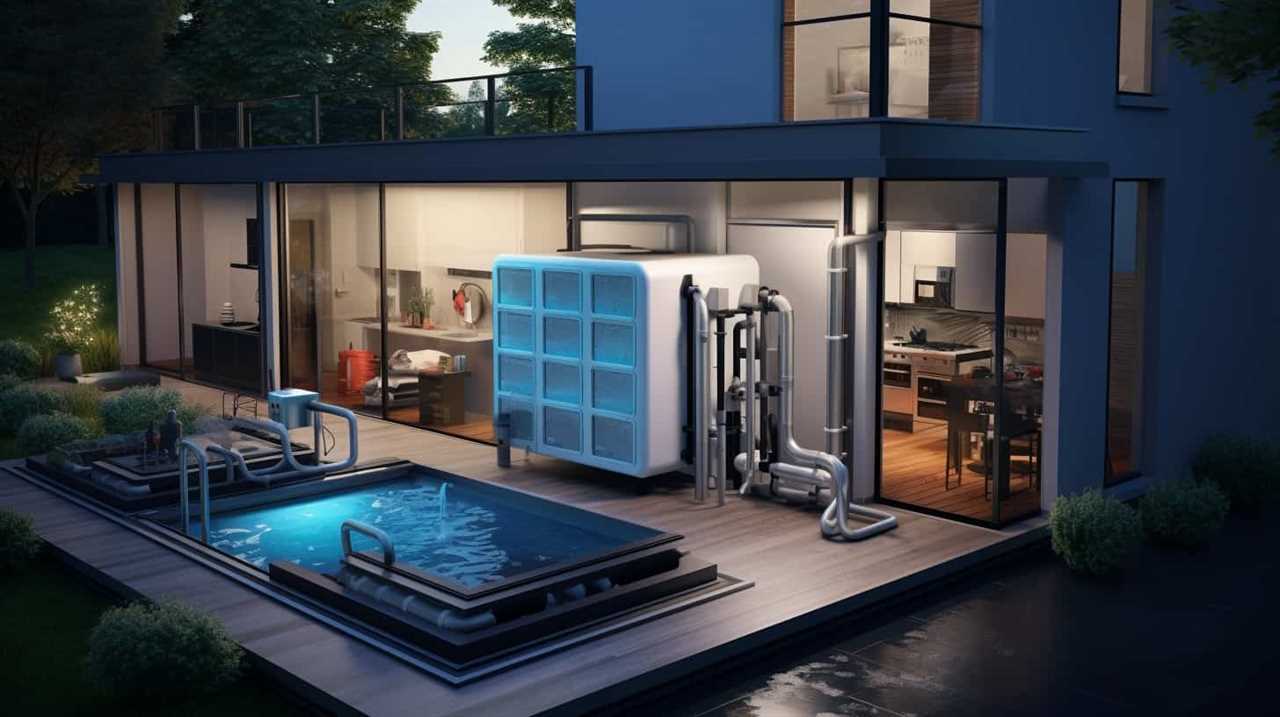
-
Smart Heat Pumps: These advanced heat pumps utilize artificial intelligence and machine learning algorithms to optimize their performance based on factors such as weather conditions and energy demand. This results in improved efficiency and energy savings.
-
Geothermal Heat Pumps: Geothermal heat pumps tap into the Earth’s natural heat to provide heating and cooling. With advancements in drilling techniques and heat exchanger designs, these systems are becoming more efficient and cost-effective.
-
Hybrid Heat Pumps: Hybrid heat pumps combine the benefits of both electric and gas technologies. By seamlessly switching between the two energy sources based on demand and price, these systems offer greater flexibility and energy savings.
-
Thermally Driven Heat Pumps: Thermally driven heat pumps use low-grade waste heat or solar energy to power their operations. These innovative systems have the potential to significantly reduce the reliance on traditional energy sources and further enhance the sustainability of heat pump technology.

As emerging heat pump technologies continue to evolve, we can look forward to a future where renewable heat pumps play a central role in achieving our energy and environmental goals.
Maximizing Energy Efficiency
Our focus is on the development of innovative technologies and advancements that can maximize the energy efficiency of renewable heat pumps. Evaluating the performance of heat pumps is crucial in identifying areas for improvement. By analyzing data on energy consumption, heat output, and system efficiency, we can optimize the design and operation of heat pumps.
Additionally, implementing energy-saving tips can further enhance the efficiency of these systems. For example, properly insulating buildings, minimizing heat loss through windows and doors, and maintaining regular maintenance and servicing can all contribute to increased energy efficiency.
Future advancements may include the use of smart technology to automate and optimize heat pump operation, as well as the integration of renewable energy sources such as solar panels or geothermal heat. These innovations hold great potential in maximizing the energy efficiency of renewable heat pumps.

Frequently Asked Questions
Are Renewable Heat Pumps Only Suitable for Certain Types of Homes or Buildings?
Renewable heat pumps are suitable for both homes and commercial buildings. However, their effectiveness can vary depending on the climate. Factors like temperature and humidity can impact their efficiency, so careful consideration is necessary for optimal performance.
How Long Does It Typically Take for a Renewable Heat Pump to Pay for Itself in Energy Savings?
It typically takes a renewable heat pump a few years to pay for itself in energy savings. The cost effectiveness is evident as it reduces energy consumption significantly, making it a smart and innovative choice for homes and buildings.
Can Renewable Heat Pumps Be Used for Both Heating and Cooling?
Yes, renewable heat pumps can be used for both heating and cooling. They offer high efficiency and numerous benefits, such as reducing energy consumption and greenhouse gas emissions.
Are There Any Government Incentives or Rebates Available for Installing a Renewable Heat Pump?
There are government incentives and renewable energy grants available for installing a renewable heat pump. These incentives can help offset the initial cost and encourage the adoption of this energy-efficient technology.

What Maintenance Is Required for a Renewable Heat Pump and How Often Should It Be Serviced?
Renewable heat pump maintenance ensures optimal performance and efficiency. Regular servicing, typically every 1-2 years, includes cleaning filters, checking refrigerant levels, inspecting electrical connections, and ensuring proper airflow.
Conclusion
As we conclude our exploration of renewable heat pumps, we’re reminded of the powerful symbolism they hold. These innovative systems not only provide efficient heating, but also represent our commitment to a sustainable future.
By harnessing the natural energy of the environment, renewable heat pumps symbolize our harmonious relationship with nature and our responsibility to protect it.
With ongoing advancements, these pumps hold immense potential in revolutionizing the way we heat our homes, paving the way for a greener and more efficient future.










